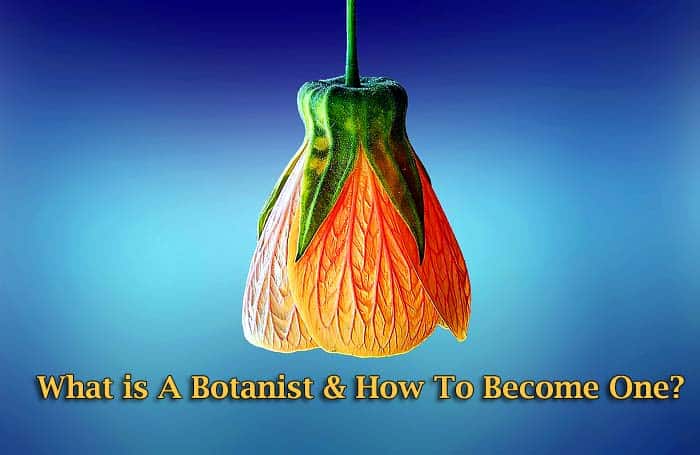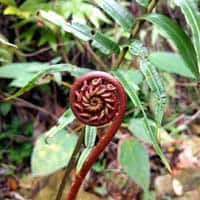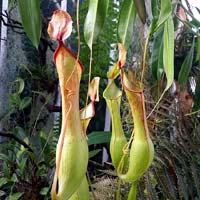Becoming A Botanist? Learn What, Where, How And Why.
Learn What is A Botanist, How to Become A Botanist, Botany Degree Programs & Courses in Universities and Online, Educational Requirements for Botanists.

Botanist & Botany Degree Programs: Also referred to as plant science or plant biology, botany is the scientific study of plants. Basically the word botany came from the Greek word “botane” which means plants.
By broad definition, plants include angiosperms (flowering plants), gymnosperms (conifers), ferns, mosses, algae, lichens, and fungi.
Although the last three organisms already belong to their own kingdoms, most scientists in the field still study these groups due to their wide resemblance with plants.
Botany is an exciting field that requires both knowledge and a love for plants. Basically, a specific kind of scientist referred to as a “botanist” is trained and works in this field.
Suppose you are having thoughts of becoming one, congrats! You have come to the right place.
Jump to:
- What Does A Botanist Do?
- Be involved in the taxonomic identification of plants
- Study the anatomy and physiology of plants
- Look into the evolutionary history of plants and their relationships
- Seek and discover the agricultural and therapeutic uses of plants
- Study plants for environmental conservation
- Forensic Botany - Solving Crimes!
- What Kind Of Educational Attainment Is Required To Become A Botanist?
- 1. Undergraduate Degree
- 2. Master's Degree
- 3. Doctorate Degree
- Where To Study Botany?
- Top 5 Universities Offer Botany Degree in the USA
- Botany Online Courses
- How Much Does A Botanist Earn?
- Why Should You Become A Botanist?
What Does A Botanist Do?
Most botanists work inside laboratories and offices where they conduct research abut plants. Sometimes these researchers go on field works and do sampling in remote areas. Some typically work full-time as teachers in secondary schools, colleges, and universities. Others are employed as scientists that perform genetic engineering on biotechnology and pharmaceutical companies.
Regardless of their jobs, botanists are tasked with the following:
Be involved in the taxonomic identification of plants
 This is perfect for people who love to be outdoors and explore different kinds of environments. The knowledge about taxonomy, the science of identifying, naming, describing, and classifying organisms are the most important tasks.
This is perfect for people who love to be outdoors and explore different kinds of environments. The knowledge about taxonomy, the science of identifying, naming, describing, and classifying organisms are the most important tasks.
- By identifying plants names and classifying them, it will be easier for researchers to identify their relationships (even variations) with their contemporaries.
![]()
Study the anatomy and physiology of plants
 Plant anatomy is a branch of botany that deals with the study of the internal structures of plants whereas plant physiology is a field of botany that investigates and studies the bodily functions and processes that occur within plants.
Plant anatomy is a branch of botany that deals with the study of the internal structures of plants whereas plant physiology is a field of botany that investigates and studies the bodily functions and processes that occur within plants.
- As pioneers in this field, botanists are tasked to advance the frontiers in the study of the various cellular and molecular processes.
![]()
Look into the evolutionary history of plants and their relationships
 The field of botany does not only require scientists and researchers to study the present-day plant and plant-like organisms but also the extinct ones.
The field of botany does not only require scientists and researchers to study the present-day plant and plant-like organisms but also the extinct ones.
- Botanists will have to compare extinct species to present life forms and from such, derive an understanding of the origin of life.
- Aside from that, by studying the phylogeny (evolutionary history) of plants, they can predict what happened during the major events that took place event before land, and aquatic plants emerged.
![]()
Seek and discover the agricultural and therapeutic uses of plants
 As the number of people on the planet increases, the need for more productive crop yield yet nutritious ones will depend primarily on the advancement of botany as a field.
As the number of people on the planet increases, the need for more productive crop yield yet nutritious ones will depend primarily on the advancement of botany as a field.
- Botanists who investigate through fundamental research how plant grow and develop are the ones who have knowledge and ideas on its application on biotechnology.
![]()
Study plants for environmental conservation
 Botanists, apart from their school or laboratory works, may also contribute to promoting knowledge and awareness about environmental protection, conservation, and restoration.
Botanists, apart from their school or laboratory works, may also contribute to promoting knowledge and awareness about environmental protection, conservation, and restoration.
- By studying various factors (e.g., biological weathering) that results to its destruction (i.e. natural calamities and anthropogenic activities), botanists can formulate certain measures to prevent it.
![]()
Forensic Botany – Solving Crimes!
 A forensic botany is a special branch within the study of botany where plant materials (such as seeds, leaves, flowers, pollens, fruits, wood, hairs, and cells) are studied in detail as it would relate to the crime scenes.
A forensic botany is a special branch within the study of botany where plant materials (such as seeds, leaves, flowers, pollens, fruits, wood, hairs, and cells) are studied in detail as it would relate to the crime scenes.
- Forensic botanists study the crime scenes using their botany skills to investigate where, when and who committed the crime.
- Forensic botanists find jobs in federal agencies & law enforcement agencies such as the FBI, the DEA and also in the private sectors as well as in universities (forensic laboratories)[1].
![]()
What Kind Of Educational Attainment Is Required To Become A Botanist?
The field of botany is so broad, and there are, in fact, numerous career opportunities for people with a botany degree. Oftentimes, people with a doctorate in botany either opt to teach at universities or indulge in research.
Nevertheless, people with mere bachelor's degrees may still find careers in numerous places and related fields.
1. Undergraduate Degree
- A degree program in Biology is comprised of fundamental biology courses such as general biology, botany (general, plant anatomy, taxonomy, and physiology), zoology, microbiology, genetics, as well as mathematics, chemistry and physics.
![]()
2. Master’s Degree
- The program usually is composed of combined lectures, case studies, seminars, and scientific research about botany.
- A Master’s degree program in botany include courses such as: cytology, genetics, cell and molecular biology, evolutionary biology, and environmental studies.
![]()
3. Doctorate Degree
- A doctorate degree in Botany typically requires the student to narrow their focus and to select an area of specialization.
- Students are required to have finished a master’s degree in Botany (or any related field) and have acquired significant experience in both laboratory and field work.
- The common courses include: plant pathology, stress physiology, and conservation and restoration of both endangered and present species.
![]()
Where To Study Botany?
Top 5 Universities Offer Botany Degree in the USA
Listed below are the top 5 most popular and best schools that offer a degree (undergraduate, graduate, and doctorate) in Biology, major in Botany.
| University | Botany Degree Offered |
|---|---|
| University of California, Riverside, CA |  The Plant Biology graduate and doctorate programs in this university holds one of the top ranks in the world. These programs encompass all possible areas that involve plants. The Plant Biology graduate and doctorate programs in this university holds one of the top ranks in the world. These programs encompass all possible areas that involve plants.More Info: University of California – Plant Biology Graduate Programs. |
| Harvard University, Cambridge, MA |  The Harvard University offers a degree in Biology (major in botany) that specifically aims to study biological diversity. To support the interests of the students and faculty, this university has numerous research libraries collectively called as the Harvard University Herbaria. The Harvard University offers a degree in Biology (major in botany) that specifically aims to study biological diversity. To support the interests of the students and faculty, this university has numerous research libraries collectively called as the Harvard University Herbaria.More Info: Harvard University – Dept of Organismic & Evolutionary Biology. |
| Cornell University, Ithaca, NY |  Cornell University offers undergraduate (major in Plant Sciences or Plant Biology), graduate (Master’s and Ph.D. in Plant Biology) studies which are both top-ranked degree programs in the world. Cornell University offers undergraduate (major in Plant Sciences or Plant Biology), graduate (Master’s and Ph.D. in Plant Biology) studies which are both top-ranked degree programs in the world.More Info: Cornell University – Plant Biology Programs. |
| Washington University, St. Louis, MO |  Washington University offers a unique graduate degree program that incorporates the use of prokaryotic and eukaryotic organisms, mosses and vascular plants in scientific experiments. This degree program is referred to as Plant and Microbial Biosciences (PMB). Washington University offers a unique graduate degree program that incorporates the use of prokaryotic and eukaryotic organisms, mosses and vascular plants in scientific experiments. This degree program is referred to as Plant and Microbial Biosciences (PMB).More Info: Washington University – PMB Programs. |
| University of Florida, Gainesville, FL |  Considered as one of the top performing schools in the world, the University of Florida offers a botany degree that gives a wide background about plant biology and biodiversity. Aside from that, the school has facilities like herbarium, ethnoecology gardens, and wide collections of plant samples. Considered as one of the top performing schools in the world, the University of Florida offers a botany degree that gives a wide background about plant biology and biodiversity. Aside from that, the school has facilities like herbarium, ethnoecology gardens, and wide collections of plant samples.More Info: University of Florida – Plant Biology & Biodiversity Programs. |
![]()
Botany Online Courses
 However when you are not available to go to school and prefer to study at your own convenience, you can opt to enroll in online botany degree courses.
However when you are not available to go to school and prefer to study at your own convenience, you can opt to enroll in online botany degree courses.
Yes, you have read it right! Due to the progress in technology, there are already many accredited schools, colleges, and universities that offer such degrees.
If you want to find out more, you can check them on the following page: Grad Schools.
![]()
How Much Does A Botanist Earn?
 The Bureau of Labor Statistics[2] states that a botanist earns an average of $79,390 per year (based on 2016). Although certain jobs in the field of botany are known to earn higher salaries as compared to others, a botanist's salary will also depend on the sector he is working on. Usually, botanists working at pharmaceutical and manufacturing corporations earn more than botanists working in the government sector.
The Bureau of Labor Statistics[2] states that a botanist earns an average of $79,390 per year (based on 2016). Although certain jobs in the field of botany are known to earn higher salaries as compared to others, a botanist's salary will also depend on the sector he is working on. Usually, botanists working at pharmaceutical and manufacturing corporations earn more than botanists working in the government sector.
![]()
Why Should You Become A Botanist?
 One of the best things about botany is that there are a lot of fields and career opportunities that one can indulge in. As such, this allows people with various backgrounds, fields of interests, abilities, and specializations to find the best fit career for them. Aside form that, the need for botanists is continuously growing along with the increase in human population as well as increasing greater environmental destruction. Businesses, industry, and research centers are also looking for botanists.
One of the best things about botany is that there are a lot of fields and career opportunities that one can indulge in. As such, this allows people with various backgrounds, fields of interests, abilities, and specializations to find the best fit career for them. Aside form that, the need for botanists is continuously growing along with the increase in human population as well as increasing greater environmental destruction. Businesses, industry, and research centers are also looking for botanists.
![]()
Come to think of it, there is nothing more fulfilling than to work in a career that is both enjoyable and beneficial for others. Now, are you ready to become a botanist and start thinking green?
![]()
Cite this page
Bio Explorer. (2026, January 2). Becoming A Botanist? Learn What, Where, How And Why.. https://www.bioexplorer.net/botanist-botany-degree-programs.html/




